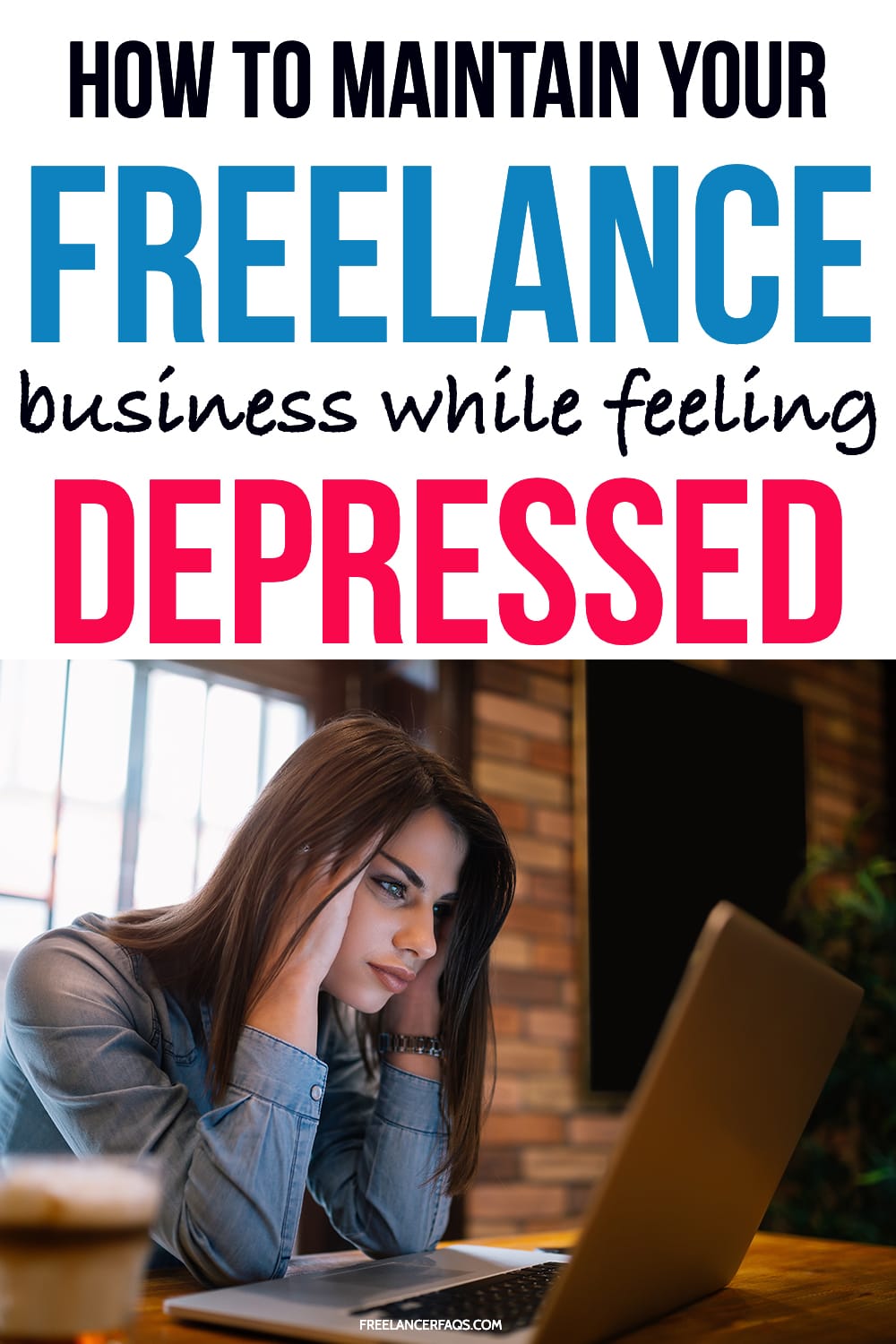Right now, freelancing is trendy.
There are approximately 53 million freelancers in America today, and by 2020 they will account for 40% of the workforce. This is promising for you because this means you can work whenever and wherever you want and have the potential to make a living from freelancing.

Social isolation from freelancing increases the risk of anxiety and depression.
Sounds tempting, right?
But here’s the kicker:
Having a freelance business can be challenging over time. It fails to mention such a tiny detail that you’re all alone doing this.
You are the one responsible for your work schedule, clients search, professional growth, security, and income. You should be super flexible. Emotions aren’t your friends anymore.
You also have to handle the negative vibes from mean clients and evil-eyed competitors. Darn it, but you have to motivate yourself all the time, struggling with procrastination, stress, and…
… depression.
Depression affects 350 million people globally, with 70% of women more likely to be affected than men, and 80% of those people don’t receive any treatment. It’s no wonder that many freelancers fail within the first year, not able to beat depression themselves!
And what’s more, the social isolation of working from home as a freelancer increases the risk of anxiety and depression.
It hurts.
In order not to share the same fate, you want to continue working despite your feelings of loneliness and sometimes despair. Yeah, easier say than do!
How can you maintain your freelance business while being depressed? How do you find the strength to continue working even if you’re unmotivated?
Keep On Freelancing Even When You’re Depressed
Did you know that freelancing can actually be good for your depression?
Don’t feel like dressing up? That’s okay. You can wear pajamas every day.
Don’t want to go out to lunch with your coworkers? Don’t need to.
That’s the perk of being a freelancer. You decide your work day.
If you prioritize your work, you can skip days, travel or go the gym for that much needed burst of endorphins.
Self-help is the best help. You have control over your projects and deadlines as well as taking the time to meditate, take breaks, or play sports as a way to de-stress and motivate yourself.
And now, for the most interesting part:
While controversial, the principle of fighting fire with fire still might help you.
Many believe that work addiction has healing properties. How often did you hear the advice of, “do something, and you’ll have no time to grieve”?
Ernest Hemingway considered work, “the most important thing in life which distracts from every misfortune” and “cures almost anything.”
It might be that your busy schedule can help to accelerate your recovery.

3 Ways to Cope With Depression Or Make It Your Friend
That’s all well and said.
You’ve got it: don’t give up and keep on freelancing.
“But how the heck can I do this if I am emotionally burnt?” you ask.
Hmm, that figures.
I must confess, I’ve been there, too; and I’ve tried all the well-known methods to cope with my saddened state:
- I took care of myself – long walks, healthy food, gym, mental breaks, sleeping well, etc.
- I did things that made me feel good – reading, listening to music.
- I developed useful habits – writing every day, drinking coffee to think more positively.
- I practiced calming techniques, such as deep breathing.
Surprisingly, all these tactics work.
Up to a certain time. Ultimately, if your depression is too severe, it’s time to seek medical help.
To maintain your business when depressed and unmotivated, you might want to arm yourself with more powerful weapons.
1. Personalize Your Workplace
Even when freelancing, your work environment matters. Workplace is a reflection of your condition, so don’t forget about it when starting a freelance business.
Do your best to make it comfortable as it enhances productivity: light, temperature level, and furniture impact your physical health, as well as boost spirits and inspire you.
Make sure your workplace is cozy:
- Get rid of the clutter.
- Bring plants.
- Add motivational quotes, pictures of your family, your favorite cup, or whatever inspires you.
Also, avoid interruptions as they are proven to undermine your satisfaction with work, too.
Consider using a light box to minimize the symptoms of seasonal affective disorder, SAD.
2. Go Social
You must admit that freelancers experience a lack of social communication, which leads to the sense of isolation and, therefore, stress and lack of motivation.
To enhance your creativity and productivity, go social: attend seminars, take part in conferences or webinars, visit local meetings, network with people on social media, etc. Feel free to express your thoughts and share your impressions with others, which will do good for your self-development.
Another issue that can happen for many freelancers is a lack of work-life balance. This doesn’t always work out for freelancers and can cause a lot of stress. Make sure to find your balance and strive to maintain it for success.
3. Use Technology to Help You Out
Mobile gadgets help us track pulse and calories we’ve burnt. Why not track your mood with smartphones, too?
Some free applications that are specifically created to help you stay calm include:
Headspace, Calm, Pacifica, Happify, I Can Be Calm… You choose!
Get Help
Stress and depression shouldn’t go ignored. If you’ve tried working through your depressed state and you still feel the same, seek medical help quickly.
But, if you’re prone to seasonal affective disorder, or lack of motivation, consider working with your depression than fighting it.
Tell us in the comments what works for you to remain motivated and to stay productive during bouts of depression.



3 Comments